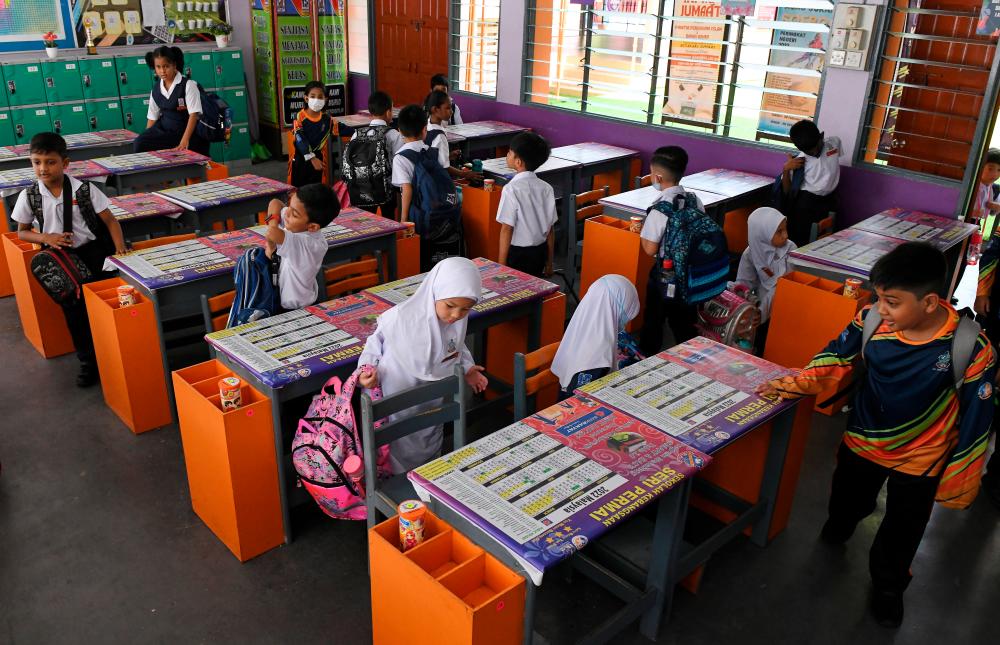MORAL education has always been a contentious subject from the moment it was introduced into the school curriculum.
First and foremost, and the biggest contention, is that not all students take the subject.
Moral education or Pendidikan Moral is offered to only non-Muslim children in all primary and secondary schools.
Muslim students do not take moral education but take Islamic Studies or Pendidikan Islam in its place.
Moral education unlike the Islamic religious subject are poles apart.
The word “moral” has been defined as being concerned with the principles of right and wrong behaviour, and the good or bad sides of a human character.
Moral education deals with equipping students with the knowledge and understanding of differentiating between right and wrong behaviour.
It inculcates honesty, civility, integrity, love, responsibility and humanitarian values in our children.
Moral education aims to shape the minds of our children to be noble and good citizens.
The right behaviour taught in the moral lessons is universally, culturally and socially accepted norms that transcend religious beliefs and understanding.
Religious education on the other hand emphasises and prioritises the teachings and beliefs of a particular religion.
Many teachers used to joke that only non-Muslim students are taught moral education because these students have no morals and we used to laugh about it.
All students need to be taught moral education in primary and secondary schools.
The knowledge and understanding of the subject will complement the religious component.
Teaching moral education to all students will help the students become better individuals who live in harmony with the multi-racial, religious and cultural norms of our society.
Students will learn to respect one another and understand one another better.
Teaching it to all students would also address the school’s disciplinary problems.
Smoking, bullying, fighting, playing truant, being disrespectful to teachers, using vulgar language, watching pornography, harassing girls, being violent and not interested in studying are some of the common disciplinary problems faced by most schools.
These disciplinary problems stem from students of all racial and religious backgrounds who are not able to distinguish rightful behaviour from wrong behaviour.
Another contention is on the teaching of moral education to non-Muslim students in schools which is not usually taught as prescribed in the syllabus.
The subject is often “hijacked” by teachers to teach more important subjects.
The subject is taken lightly in schools, which is why we have students with no moral values who show no respect to their elders, misbehave in public, have disciplinary problems and are a threat to society.
If we feel that our young are spoilt and delinquent, then we need to get back to the basics.
We need to teach children the right and noble values so that they will love one another, respect one another and live in peace with one another.
The subject has not been given the due importance and honour it deserves.
We have been lackadaisical about its implementation, assessment and evaluation.
In the past, many students learned moral education by rote and memorisation to pass school examinations.
The objective of moral education is to equip students with the knowledge and understanding of differentiating between right and wrong behaviour so that they will grow up to be good citizens.
Though the subject has wonderful ideals and aspirations, the implementation, teaching and assessment of the subject leave much to be desired.
Moral education has to be taught and assessed holistically, meaningfully and practically.
We need to arrest the moral decline among our youths before it spirals out of control and moral education is the subject in our schools that can save the minds of our young and shape them to be noble and good.
Therefore, the teaching of moral education in schools should be reformed, revised and restructured and all students must be taught the subject.
Teachers who teach the subject must have a clear understanding of the moral education philosophy and be of good moral standing.
Assessment should be in the form of a written and project format which provides students with an avenue to apply in real-life situations what is learnt in the classroom.
The moral conduct and behaviour of students through observations and interactions with class teachers and other teachers should be an ongoing assessment.
Teachers generally know whether students are kind, generous, helpful and hardworking.
These can be a good yardstick to assess their moral conduct.
We do not want students to be book smart but rather people smart because academic brilliance is no compensation for the poverty of character.
Moral education equips students with knowledge, skills and values in moral reasoning, moral emotions and moral action.
The unity, prosperity and development of the country are grounded on sound moral principles and universal noble values of the people.
So, make Moral Education a must for all students.
Comments: letters@thesundaily.com









